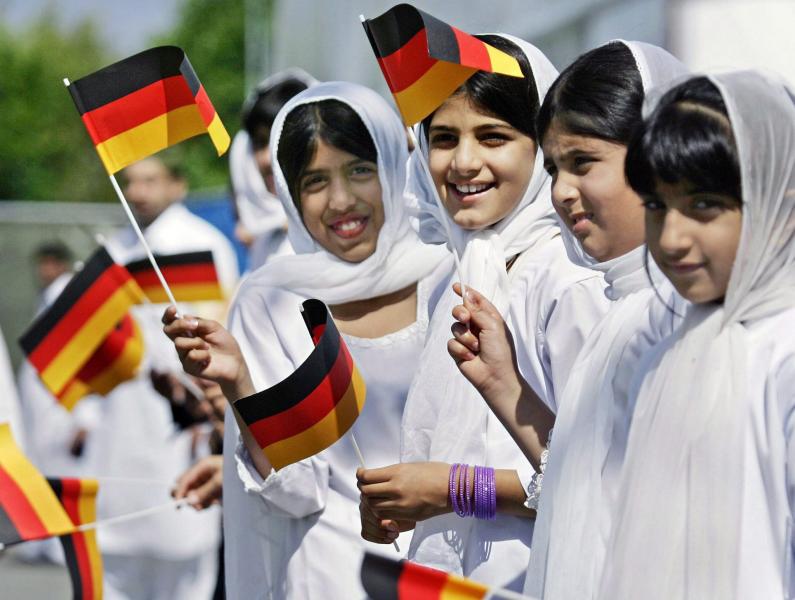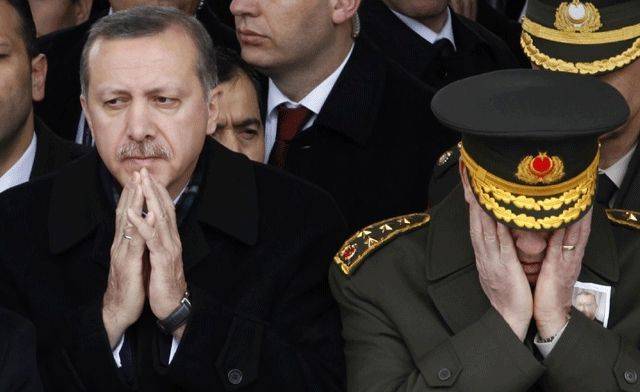Tsar! Very nice, king...
On April 16, a referendum was held in Turkey, according to the results of which 18 amendments should be made to the country’s constitution. The list of changes put to the referendum was received ambiguously both within Turkey and outside the country. The results of the plebescite are quite eloquent and indicate that there is no unity in Turkey in relation to the power of the current president.
Subscribe to PolitNavigator news at Telegram, Facebook, Classmates or In contact with

Some observers call Erdogan's list of amendments Turkey's drift towards sultanization, while supporters of the current president are completely delighted with the amendments: the country will receive a master, a new great and wise father of the nation after Ataturk.
In fact, after reviewing the list of constitutional amendments, it becomes clear that the current balance of powers of power is almost completely eliminated in Turkey. In return, Erdogan is given virtually unlimited power. From November 3, 2019, when the amendments come into force after the presidential and parliamentary elections, the newly-minted president will be free to dissolve parliament with a wave of his hand, remove ministers and judges from office, appoint as many as five vice-presidents to assist him, declare a state of emergency, and also issue decrees having the force of law. Not weak, right?

However, some incompletely gnawed bones were left to parliament and the beloved Turkish electorate. For example, one of the points of the amendments declares the neutrality and impartiality of the judicial system, increases the number of parliamentary seats, lowers the age limit for parliamentary candidates, compulsory military service is abolished for them, and military courts are abolished. You can also note that the issue of restoring the death penalty in Turkey has been temporarily removed from the agenda. Apparently, the Erdogan administration has not completely lost hope of Turkey joining the EU.
True, in his victory speech following the results of the plebescite, Erdogan said that in the near future two more referendums could lie in wait for the Turks - on the need for Turkey to join the EU and on the restoration of the death penalty.
Otherwise, Turkey, already not abundant in civil liberties, is moving from soft to hard authoritarianism. In fact, Erdogan, without a military coup, but through constitutional “reform,” wants to become dictator Pinochet. Or, if you prefer, Erdochet.
Be that as it may, Erdogan’s victory is not crushing and, it seems, not final. Having media resources and administrative levers of influence in your hands, having organized political purges and repressions on the eve of the referendum in order to end up with an advantage of only 1,18% of the votes - you have to try hard. Needless to say, this is a dubious achievement. Somewhere even comparable to a Pyrrhic victory.
Repression in this case is not just a figure of speech. Immediately before the referendum, the Turkish authorities cleaned up the active opposition in Turkish universities. In particular, teachers Nurie Gülmen and Semih Ozakça were arrested. The newspaper “Jumhuriyat”, which had long been taken note of by the Erdoganites, was subjected to security destruction.

The voting map for the regions of Turkey presents a rather interesting picture. Türkiye is clearly divided in its preferences. The western, southern and eastern regions of the country, including the capitals Ankara and Istanbul, voted against the amendments. The Turkish hinterland and the decrepit witnesses of “the times of Ochakov and the conquest of Crimea” spoke in favor of the amendments. In fact, the Turkish village recognized Erdogan as its undisputed leader. Yes, the countryside gives the country passionaries, but all revolutions are made in the cities. As a rule, in capitals. What Erdogan clearly succeeded in was dissecting the opposition territorially, dividing the protest provinces with a thick layer of rural hinterland.
In addition to the Turkish hinterland, Erdogan’s reforms received “approval” from the Turkish diaspora. In particular, the majority of Turks from Germany spoke in his favor - 63%, the Netherlands - 70%, but the strongest support was expressed by Lebanese Turks - almost 98% - including as many as 1058 people. But Russian and Ukrainian Turks in the majority spoke out against the constitutional amendments - 74% and 64%, respectively.

Observers report cheating and fraud during the referendum process. It is alleged that the Turkish Central Election Commission, when counting votes, counted 2.5 million ballots without precinct commission stamps, which is directly prohibited by the voting law. Observers also have questions about the 840 thousand spoiled ballots accepted for vote counting. The leaders of the pro-Kurdish Peoples' Democracy Party (PDP) express open doubt about the results of the referendum, which, in general, is understandable - the absolutization of presidential power does not bring anything good for the Kurds. In addition to Kurdish political movements, left-wing parties in Turkey will also be obvious opponents of Erdogan’s “reforms”.
In his victory speech, Erdogan drew historical parallels, saying that “Turkey has answered a question that has been debated for 200 years.” And, it must be said, these parallels are quite dubious, since 200 years ago, under the influence of the penetration of European enlightenment, restrictions were adopted in the absolutist Ottoman Empire that curtailed the influence of the Janissaries and gave the Sultan’s power a more secular character, while new constitutional amendments, on the contrary, excessively expand personal the power of Erdogan, who does not hide his ambition to become not only the unifier of the lands of Great Turan, but also to take over from the Saudis the functions of the main Islamic political leader.
What's next? Observers and analysts tend to be more pessimistic about Turkey's future. The conclusions differ only in shades of skepticism. Thus, there is an opinion that a hundred years of Turkey’s republican system have gone down the drain and Turkey, on the way to strengthening the presidential form of government, will finally slide into dictatorship. Milder scenarios for the country’s development involve a gradual tightening of the screws, persecution of dissidents, and increased contradictions between Turkey and the EU. Relations with Russia will go unevenly, zigzag, jumping from warm to cold and back. At the same time, economic ties look more or less stable, while political relations can be very strained, at least on the Syrian issue.
Fortunately, in the case of the Turkish referendum, a kind of Newton’s Third Law in public relations worked: the plebscite clearly and clearly highlighted not only half of the country’s adult population as opponents of Erdogan’s policies, but also identified a single leader of the opposition.

The leader of the “No” movement was Kemal Kılıçdaroğlu, head of the Republican People's Party. It will be extremely difficult for dictator Erdochet to unleash new repressions without consequences against half the country with the leader of the opposition at its head.
The reaction of Europe and the United States is predictable: they saw everything that needed to be seen and spoke out quite unequivocally in the sense that democracy in Turkey is limited by the means of democracy and an overly authoritarian Turkey cannot count on joining “the single family of European nations.”
Representatives of the self-proclaimed “Mejlis of the Crimean Tatars” reacted to the Turkish referendum in a rather unique way. The top of the “Majlis” (Dzhemilev, Chubarov, Islyamov) chose not to notice any referendum, focusing on the discussion of the candidacy of a new contestant - a Crimean Tatar at Eurovision.

However, from the information mouthpieces serving the Majlis, there is criticism of Erdogan and his initiatives.
Basically, this criticism is of a general nature, but judging by the phrases that emerge, it can be assumed that the Mejlis members are concerned about the discrepancy between Erdogan’s Turkey and the EU, the decreasing role of the army in the life of the country, as well as a certain cooling of interest of Turkish officials in the return of Crimea to the control of the “Medjlis”. It’s not that Erdogan and the Turkish special services have completely abandoned such an instrument as the “Majlis”, but Turkish delegations visiting the peninsula stubbornly cannot find discrimination against the Crimean Tatars by Russia, and even in Turkey itself the political popularity of such odious figures is declining , like Dzhemilev and Chubarov. Including among the local Crimean Tatar diaspora.
However, Dzhemilev has already officially licked, congratulating “his high-ranking person” on behalf of the entire Crimean Tatar people on the successful outcome of the referendum. He licked it shallowly, not right down to the tonsils, but not superficially either. Still would! Pan-Aga Dzhemilev accounts for the lion's share of targeted Turkish financial assistance, and what's more, the construction business in Turkey is also a big deal.
The pan-headed “spilnota” responded to the results of the Turkish referendum in a very interesting way. A commonplace is the comparison of the protests on Taksim Square with the Euromaidan, which in itself is strange, since Erdogan’s “reforms” and the coup d’etat in Ukraine are precisely related by the turn towards obscurantism and the clampdown on civil liberties.

The protesters in Taksim Square are not calling, for example, to ban the Greek or Armenian languages and are not calling for anyone to be slandered on Gilyak grounds on political or national grounds.
The reaction of official Russia to the Turkish referendum is restrained. The Kremlin understands perfectly well what the ultra-conservative Turkish turn is leading to. Foal optimism, as during Trump’s presidential campaign, radiates from the political farce named after Zhirinovsky.

The most important thing that remains behind the scenes is why Erdogan, who already has exceptional powers, needed a referendum with radical changes to the constitution that could put him at odds with the European establishment, which is sensitive to all sorts of clamps and restrictions and actually marked a split in the country? After all, taking into account the general Turkish instability, external and internal forces will not fail to take advantage of such a split, staging a new palace coup.
If you find an error, please select a piece of text and press Ctrl + Enter.



Thank you!
Now the editors are aware.